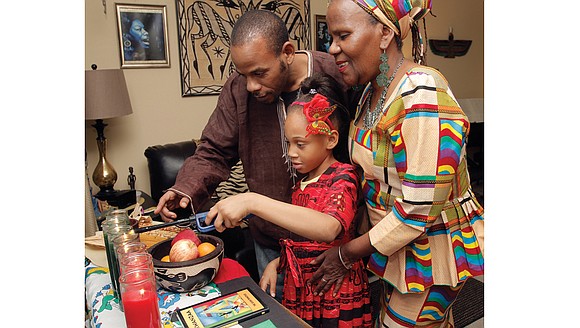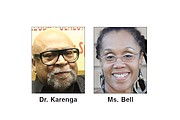Kwanzaa 50-year-old holiday
Henrico family sees value, impact of celebrating the 7 principles of the 50-year-old holiday
12/30/2016, 9:22 a.m.

By Lauren Northington
Shakila Davis and her family have celebrated Kwanzaa since the 1970s.
And for Mrs. Davis, celebrating the African-American holiday that is now in its 50th year is as important as ever.
“I’ve been teaching this holiday to people since the 1970s,” said the retired home economics teacher at Henrico High School and yoga instructor, “and Kwanzaa is for all of us in the diaspora.”
Kwanzaa, which officially began on Monday, Dec. 26, and lasts until Sunday, Jan. 1, celebrates seven principles, or the Nguzo Saba, one of which is observed each day during the holiday.
The seven principles are “umoja” or unity; “kujichagulia” or self-determination; “ujima” or collective work and responsibility; “ujamaa” or cooperative economics; “nia” or purpose; “kuumba” or creativity; and “imani” or faith.
During the weeklong celebration, observers light one candle of the kinara or candleholder, share stories of family history and exchange gifts, often books on African-American history and culture.
For many in the United States and throughout the world, Kwanzaa is a time during which African and African-American culture is intentionally celebrated.
The holiday and its rituals generally are celebrated using Kiswahili, a language chosen because of its roots as a trade language in Africa.
Mrs. Davis, who held community Kwanzaa celebrations yearly at the North Richmond YMCA before her recent retirement, believes Kwanzaa built pride in her children as thinkers and doers.
Her sons, Ramel Dotson and Hakim Bey, are now 42 and 40, respectively. One is a martial arts business owner and the other works for the U.S. Postal Service. They live in the Richmond area.
She has four grandchildren ranging in age from 8 to 16 who are with her during the school break.
“Each day, we wake up and say to one another, ‘Habari gani?’ ” Mrs. Davis said on Wednesday, referring to the celebratory Kwanzaa greeting meaning, “What’s the news?”
“And they responded, ‘Ujima,’ because that is the principle we’re celebrating today,” she continued.
“And then, of course, the next question they asked today is, ‘What should we clean up, Grandma?’ ” Mrs. Davis said laughingly. “The children are very helpful.”
Ujima, observed on Wednesday, Dec. 28, celebrates collective work and responsibility, said Mrs. Davis.
“I’ve got one making the beds up, one cleaning the bathroom as we speak.”
Mrs. Davis said she, her husband, Kevin Davis, their two sons and grandchildren host a large Kwanzaa party at their Western Henrico County home for friends and family, offering daily African and diaspora history lessons to their grandchildren and lighting the kinara.
Dr. Maulana Karenga, an Africana studies professor at California State University, Long Beach, created the seven-day holiday in 1966 as a celebration of the lives and culture of people of African descent.
“We reflect on the expansive meaning of being African in the world, on the context and issues of our times, and on our way forward in struggle to forge a future responsive to our needs and interests as well as those of the world,” Dr. Karenga, a native of Maryland’s Eastern Shore, said in a statement last week on Kwanzaa.
“The 50th anniversary celebration is also in honor and thanks to our people, African-Americans and African peoples everywhere,” he continued. “For it is they who embraced Kwanzaa when it was offered to them, received it as their own, nurtured it and made it the national and international celebration of our African selves and the history and culture that grounds us and gives us identity, purpose and direction.”
The Davis family couldn’t agree more.
“Everyone has something to pass down. We need something to pass down, too, that’s ours,” said Mrs. Davis.
“Kwanzaa is not a replacement for Christmas. It is not a substitution for Christmas. It’s a celebration of life and culture,” she said.
Like Christmas and Hanukkah, the major holidays with which Kwanzaa shares the season, Kwanzaa has its symbols. In addition to the kinara, there are fruits and vegetables, corn and the “kikombe cha umoja,” or unity cup, all traditionally placed on a mat called a “mkeka.”
Rituals aside, it’s the underpinnings of Kwanzaa and its proud embrace of African identity, culture and history that seem to speak the loudest to those who celebrate it.
“A part of our evolution as Africans in America was to not be African at all,” said Janine Y. Bell, president of the Elegba Folklore Society in Richmond and founder of Richmond’s largest Kwanzaa celebration, the Capital City Kwanzaa Festival.
This year’s festival will be 5 p.m. Friday, Dec. 30, at the Altria Theater, 6 N. Laurel St.
“So Kwanzaa came about to help us reconnect with that center point, with that foundation in who we are,” said Ms. Bell.
That sense of identity, of pride in a culture too often neglected, has always appealed to Mrs. Davis and her husband.
“Dr. Karenga wanted to encourage people to have something to reflect who they are,” said the former teacher.
“For Africans who live in the diaspora, what you get in the schoolbooks, and in this country in general, is that we were slaves,” she said.
“But we weren’t. We were kings and queens. We were nurses and doctors, artists and writers. We were family members and had complex economies. So what we do for Kwanzaa is reinforce principles that will keep us united in our culture,” said Mrs. Davis as she was preparing a celebratory dinner of Jollof rice, kale salad — “no fire, no meat,” Mrs. Davis said — okra, yams and fruit.
This positive cultural narrative is particularly critical, observers said, as we prepare for a new president to take office amid rising crime in major metropolitan areas and the continuation of the school-to-prison pipeline nationwide.
Ms. Bell believes that current social realities facilitate the continued necessity of holidays like Kwanzaa.
“We can look at the various displays of disarray in our community, and we know that if we were more unified, if we could build something in our neighborhood, how much better life would be,” she said. “All of those concepts are expressed in the seven principles to help us throughout the year.”
Mrs. Davis agrees.
On Friday, she and her family will celebrate the principle of “nia,” or purpose. This principle in particular resonates with Mrs. Davis.
“God has given all of us a purpose,” she said. “It may be unfolded to you early. You may see the light when you are older. But your destiny has already been charted for you. Listen to the universe, listen to the elders and you will find your path,” she said.
And as she begins each new year, Kwanzaa reminds her of that.
It’s powerful, she said, “to be able to define yourself.”







